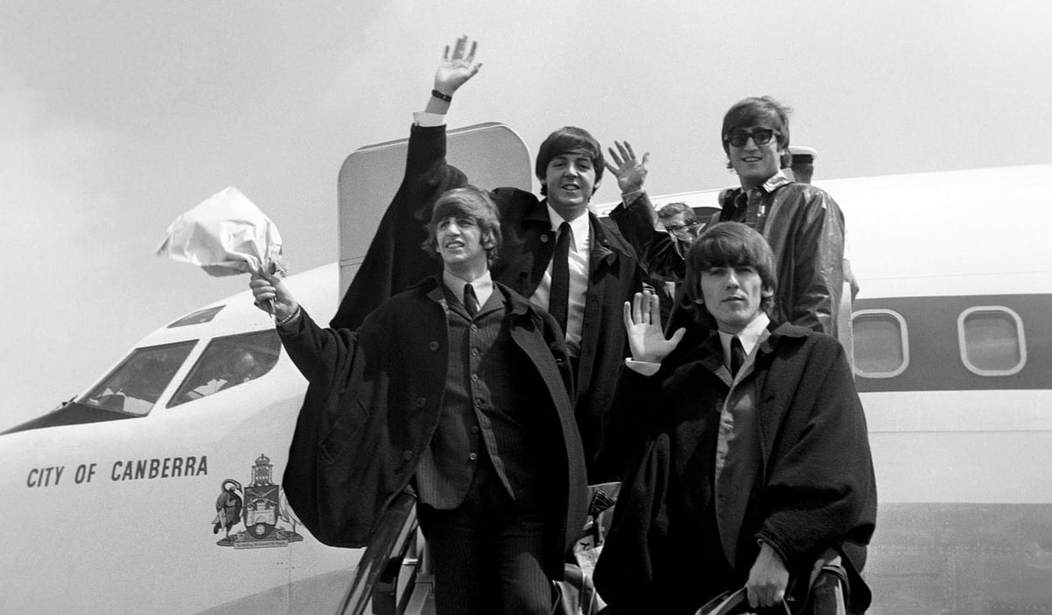Today, songs from one of the greatest rock albums of all time will play somewhere, even though the album is turning 50 years old. Released on December 3, 1965, Rubber Soul by The Beatles is ranked by an epic panel at Rolling Stone as the fifth greatest rock album of all time.
To Beatles fans, Rubber Soul marked the dramatic transition from a fun pop act to a band that would dominate the culture like nothing before and nothing since. To music fans, Rubber Soul marked the dawn of an album-driven era where long-play records replaced a singles-driven industry.
Consider Rubber Soul’s longevity in context. Fifty years before Rubber Soul was released, “They Didn’t Believe Me” by Harry Macdonough and Alice Green was the most popular song in the country (audio at link). Were Americans in 1965 spinning versions of this sonic relic? Not likely.
But Rubber Soul endures.
George Harrison called Rubber Soul “the best one we made,” because “we were suddenly hearing sounds that we weren’t able to hear before.” The songs from Rubber Soul performed in the 1966 tour were also the last pieces of new material the Beatles would ever play live in a concert together.
Before Rubber Soul, music sold predominantly as singles. Albums were little more than a collection of a few hit singles surrounded by filler and fluff. From front to back, Rubber Soul was top shelf.
“Drive My Car,” “Norwegian Wood,” “Nowhere Man,” “Michelle,” and “In My Life” are songs still in regular rotation, and culturally familiar.
What separated Rubber Soul from everything before it, including previous Beatles albums, is that the familiar songs had enduring companion tracks.
“Girl,” “I’m Looking Through You,” “Wait,” and more all stood on their own. This was no accident. The Beatles wanted desperately to be serious artists rather than teen sensations.
Freed from record company pressures, The Beatles could do anything they wanted, and the result was Rubber Soul. In a 1971 interview, Lennon said:
Finally, we took over the studio. In the early days we had to take what we were given – we didn’t know how we could get more bass. We were learning the technique on ‘Rubber Soul.’ We were more precise about making the album.
The mood and tone also changed entirely on Rubber Soul. Paul McCartney:
The early material was directly relating to our fans, saying, “Please buy this record,” but now we’d come to a point where we thought, “We’ve done that. Now we can branch out into songs that are more surreal, a little more entertaining.” And other people were starting to arrive on the scene who were influential. Dylan was influencing us quite heavily at that point.
John Lennon especially began to blossom as a serious songwriter on Rubber Soul. To Lennon, “In My Life” marked a permanent departure from the Beatles of Beatlemania.
Lennon:
I think “In My Life” was the first song that I wrote that was really, consciously about my life, and it was sparked by a remark a journalist and writer in England made after In His Own Write came out. I think “In My Life” was after In His Own Write… But he said to me, “Why don’t you put some of the way you write in the book, as it were, in the songs? Or why don’t you put something about your childhood into the songs?”
Lesser known songs like “Wait” show the band in full collaboration – with Lennon and McCarthy trading lead vocals, producing harmonies and a catchy Harrison riff.
https://www.youtube.com/watch?v=N8yStt_so1U
Rubber Soul spent a total of 59 weeks on the U.S. charts, six of them at number one. The album was huge despite, or perhaps because of, so many strange new sounds: George Harrison’s sitar on “Norwegian Wood,” a fuzz bass on “Think for Yourself,” and a serious and sometimes sinister John Lennon, particularly on “Run for Your Life.” In hindsight, “Run for Your Life” is probably a micro-aggression on modern college campuses:
Well I’d rather see you dead, little girl/ Than to be with another man/ You better keep your head, little girl/ Or I won’t know where I am/ You better run for your life if you can, little girl/ Hide your head in the sand little girl/ Catch you with another man/ That’s the end, little girl
One fan of Rubber Soul was Brian Wilson of the Beach Boys. After hearing Rubber Soul, he vowed to make the greatest rock album of all time, a project that would become Pet Sounds. In an odd game of leapfrog, a newly pressed copy of Pet Sounds was flown by Brian Johnson of the Beach Boys to a London hotel room where he played it for McCartney and Lennon.
Pet Sounds left such an impression on the pair that Sgt. Pepper’s Lonely Hearts Club Band followed. Beatles producer George Martin said that “without Pet Sounds, Sgt. Pepper would have never happened.” Rubber Soul started this game of creative leapfrog that would change the nature of rock music.











Join the conversation as a VIP Member